- India has the largest chunk of Waqf lands in the world. Here are
answers to frequently asked questions about Waqf properties & boards. Each
Q&A has an observation. We also examine provisions of the Companies and
Income-Tax Acts and note that equality before the law is a myth.
A few headlines and article ignited this writer’s interest in waqf.
One was the statement that “India has the largest Waqf land in the world? As per estimation by Sachar Committee Report, 2006 there are about 4.9 lakh registered Waqf properties comprising of about 6 lakh acres of land, approximate market value of these properties is Rs. 1.20 lakh crore.” Source Maharashtra alone has
92,000 acres of land as Waqf properties. Source
A
Bar & Bench story said, “The Supreme Court recently held that in the absence of any proof of dedication or user, a dilapidated wall or a platform cannot be conferred a status of a religious place for the purpose of offering prayers or Namaaz (Waqf Board Rajasthan vs Jindal Saw Limited).” Source
Another recent Supreme Court order stated that, “Land
dedicated to religious and pious purpose is not immune from being vested in the
state. Waqf Board is part of State under Article 12. The Board had the power to
declare a land as Wakf property but any such exercise required a thorough
enquiry and hearing the other side. In the present case, no such enquiry was
conducted as required under Section 40 of the Act and hence the notification
was termed bad in law.” Source Hindustan Times
(All through the essay Hindus, Buddhists, Jains and Sikhs are referred to as ‘Followers of Dharma’. Wherever section numbers are given it means, unless stated, it is a reference to The Waqt Act, 1995).
This article was first published in www.swarajyamag.com
At
the outset must state that I am a Chartered Accountant, not a lawyer and subject
expert. Errors if any are unintended and without malafide intent. Format of FAQ
is question, answer and observations in blue. In case of any error please mail with
references. The purpose of this FAQ is to provoke thought. One does not claim
to know all.
Q1. What is the concept of Waqf?
A1. “Section 3(r) of The Waqf Act, 1995 defines ‘waqf’ as the permanent dedication by any person of any movable or immovable property for any purpose recognised by Muslim Law as pious, religious or charitable.” 3
This Indiatimes report explains, “In simple words, waqf is a property which is used for religious and charitable purposes. In Islamic law, a waqf property is permanently dedicated to Allah, and once a property is dedicated as waqf, it remains as waqf forever signifying that a waqf is perpetual, inalienable and irrevocable in nature.”
According
to the Madhya Pradesh Waqf Board site, “Waqf is a Voluntary, permanent, irrevocable dedication of a portion of one’s wealth-in cash or kind- to Allah. Once a waqf, it never gets gifted, inherited, or sold. It belongs to Allah and the corpus of the waqf always remains intact. The fruits of the waqf may be utilised for any shari’ah compliant purpose.”
According to an Indian
Express report, “The waqf is similar to a trust established under the Indian Trusts Act, 1882, but trusts can be set up for a broader purpose than religious and charitable uses. 2 (See Q23/24 for more on this).
Comment: Is this concept of Waqf property being dedicated to The Almighty appropriate in a Constitution driven state? Do state and Central governments work on the basis of Constitution
or compliance with shariah?
Q2. How is Waqf created?
A2. “A waqf can be formed through a deed or instrument, or a property can be deemed waqf if it has been used for religious or charitable purposes for a long period of time.” Source IndianExpress
A non-Muslim can also create a waqf but
the individual must profess Islam and the objective of creating the waqf has to
be Islamic.
Section 3 (s) states, “Waqf deed” means any deed or instrument by which a Waqf has been created and includes any valid subsequent deed or instrument by which any of the terms of the original dedication have been varied.”
According to Section 36, it is mandatory
to register all waqf at the office of the board. The application of
registration shall be made by the mutawalli. 3
Q3. Can a piece of land (public or private) be declared Waqf
property just because it is used for praying purposes for say 3 years?
A3. No, a piece of
land (public or private) used for praying purposes for say three years cannot
be construed as a Waqf property.
Q4. Who is a Waqif?
A4. Waqif is a person
who creates a waqf for the beneficiary. Section 3 (a) of the 1995 Act states, “beneficiary means a person or object for whose benefit a (waqf) is created and includes religious, pious and charitable objects and any other objects of public utility sanctioned by the Muslim law.”
Q5 How are Waqf properties managed?
A5. Properties are managed by Waqf
(equivalent of a Trust) and State Waqf Boards.
According
to section 13 (3), “The Board shall be a body corporate having perpetual succession and a common seal with power to acquire and hold property and to transfer any such property subject to such conditions and restrictions as may be prescribed and shall by the said name sue and be sued.”
If
conditions prescribed under the Act are fulfilled the state shall have separate
boards for Shia and Sunnis. For e.g. West Bengal board site say it is a
body corporate.
Q6. Is the Waqf Board a Section 8 company under the Companies
Act or a Trust?
A6. Legal sources
indicate it is neither a Section 8 company nor a trust? Was it then created by
a special statute? Also see Q37.
Comment/Question: What type of legal entity is the Waqf Board?
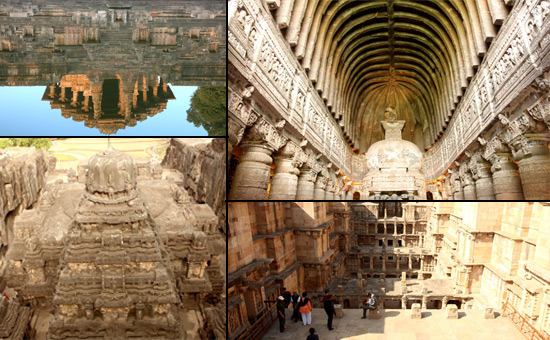 There is more to India than the Taj-West.
There is more to India than the Taj-West.
Q7. Who can be Members of
the state level Waqf Board?
A7. According to
section 14, members of the Waqf Board must be Muslims be it a MP, MLA, Member
of the Bar Council, Expert in Town Planning or Management, scholar in Islamic
Theology and not below the rank of the joint secretary. Simply put, being a
Muslim is a pre-requisite. The State Boards shall have a Chief Executive Officer (only Muslim) appointed
by the State government. A mutawalli will look after
individual properties.
Comment/question: Does any Law allow an only Hindu framework in management of their religious institutions or heritage sites? If only Muslims are by law allowed to become CEO’s of the State Waqf Boards then Hindu Temples are well within their rights to let only Hindus have shops in their temples premises.
Q8. Can Waqf Board accept donations and issue receipts under
section 80 (G) of the Income-Tax Act 1961.
A8. Legal sources say
Yes.
Comment: Experts believe that Waqf can issue receipts provided it
is registered as a non-religious charity. If their activities are partly
religious, it would be interesting to know the basis of exemption. Also
see Q40.
Q9. Does the CEO of the State Waqf Boards have to be Muslim?
A9. Yes according to zakatindia
site. ((Section 23 states the
CEO has to be a Muslim). Members of the board also have to be Muslim. Of the 32 State Waqf Boards, 27 of the
Chief Executive Officers are Muslims with 5 posts being vacant (accessed on
29.5.22 at 1.15 pm)
Question: Charitable trusts created by Hindus cannot state under law that the Managing Trustee shall only be a Hindu?
Q10. What is the Central Waqf Council?
A10. State Waqf Boards are also
responsible to the Central Waqf Council of which a Union Minister is ex-officio
Chairman. The
Central Waqf Council presently has 8 members, all Muslims. See here Also see Q16 The Council’s expenses are paid for by the Waqf Board.
Comment/question: In case of a shortfall in contributions by Waqf Board, it is not clear who funds the Council’s expenses.
Is
there a similar Central Council for managing Hindu temple and heritage
properties?
Must
a Union Minister be the Chairperson of a religious body in a so called secular
(whatever that means) state?
Q11. When was the law on Waqf introduced?
A11. The Mussulman Wakf Act, 1923 was
introduced by the British.
Note
that the British first introduced The Madras Religious and Charitable
Endowments Act 1925. It drew large protests from Muslims and Christians. Thus,
it was redrafted to exclude them, made applicable to Hindus only and renamed as the Madras Hindu Religious and Endowments Act 1927. In 1925, the Sikh Gurudwaras Act was passed that brought gurdwaras under the control of an elected body of Sikhs. Independent India continued with these laws.
Also read How Hindus temples came under Government
control?
So the British had one set of laws for Hindus and another for the rest.
The Indiatimes report adds, “The Waqf Act, 1954 was the first of its kind. It underwent many amendments. Finally, The Waqf Act 1995 was enacted. This Act established the Central Waqf Council and State Waqf Boards.” The reformist Hindu Succession Act 1956 was
passed for the Followers of Dharma.
Comment: Nehru and Ambedkar were at the forefront of introducing reforms for Hindus, why did they leave the Muslims out?
Q12. Does the Waqf Act 1995 apply all
over India?
A12. The 1995 Act states it is not applicable to the state of Jammu and Kashmir and Durgah Khawaja Saheb, Ajmer to
which the Durgah Khawaja Saheb Act, 1955 applies. (Section 2)
Post abrogation of Article 370 the Act is applicable
to the Union Territory of Jammu and Kashmir. However, there is a request for
certain changes.
Also
read
J&K Proposes Modifications in the Central
Waqf Act
Comment: It would be interesting to know why the Ajmer Durgah was not covered by the 1995 Act and how the provisions of the 1955 Act are different from the Act it is governed by.
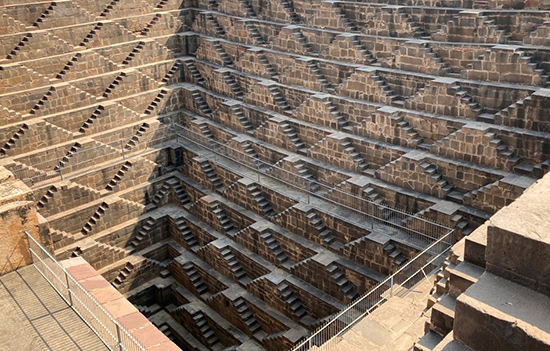 Chand Baori Step well near Jaipur is a wonder of the world.
Chand Baori Step well near Jaipur is a wonder of the world.
Q13. What is the origin of Waqf Land?
A13. Author Praful Goradia wrote in Daily Pioneer, “The institution began with a place called Khaybar in Arabia. It was the genius for turning a conquered property into an inalienable ownership. Another commentator, Ahmedullah Khan has recalled several properties which were brought under Waqf much earlier. For example, the dargah of Moinuddin Chishti at Ajmer Sharief as well as Nagaur in Rajputana.”
1
The
Survey Commissioner (who undertakes preliminary survey of Auqaf) shall, while
making any inquiry, have the same powers as are vested in a civil court.
(Section 4 of 1995 Act).
Question: Does a surveyor of a Mutt, Temple, Gurudwara have similar powers?
According to Section 8, “The total cost of making a survey including the cost of publication of the list or lists of auqaf under this Chapter shall be borne by the State Government.”
Question: Should tax payer’s money be used for what is purely private property?
Q14. Can land and heritage structures owned by Muslim Rulers
before Independence become Waqf property?
A14. Legal sources say
both can become waqf property!
Comment/question: This is a tool for concerned Indian Muslims to see
themselves as inheritors of foreign invaders. Is
such a facility given to Christians since the British were Christian?
Q15. 200 acres of land
were given by King Achyuta Deva Raya, younger brother of Krishna Deva Raya to
Shahul Hameed Auwliya for the Nagore Dargah? Source
A15. Legal sources state, “As far as time is considered, for a land to be ascertained as waqf, it can be since the Islamic Law comes in picture.” This matter needs to be examined further.
Questions: Is India governed by Islamic Law or the Constitution? Is it correct to include under Waqf today, property that was acquired when the Muslims ruled India?
Q16. What is the source of income of
Waqf Board and Central Waqf Council?
A16. Under Section 72
mutawallis are liable to pay to the State Waqf Board 7% of the net annual
income derived from waqf properties of which the net annual income is not less
than 5000 rupees.
Section 10 (1) of
the 1995 act states that every state waqf board should pay from its waqf fund
annually to the council 1 % of the aggregate of the net annual income of the
waqf.
Q17. All the funds received by the council from the state waqf boards and all the funds received as donations, benefactions and grants will be deposited in the Central Waqf Fund (section 10 (3). Source BlogIpleaders.in Is surplus of
income over expenditure chargeable to income-tax?
A17. Legal sources state that a
surplus of income over expenditure of the Waqf Board or Central Waqf Council is
liable to income-tax.
Q18. How can Waqf
Board income be used?
A18. The proceeds are typically used to finance educational institutions, graveyards, mosques and shelter homes.
Q19. Do educational institutions mean those providing secular or
religious (madrassas) education?
A19. Legal sources say
covers both.
Question: Are Hindu trusts permitted to fund religious education?
 There is more to India than the Taj-East.
There is more to India than the Taj-East.
Q20. Who is a Mutawalli?
A20. “A ‘mutawalli’ is appointed by a waqif, or by a competent authority, to manage or administer a waqf.”
According
to Section 71 of the 1995 Act, the mutawalli of every waqf, whose net annual
income exceeds Rs 5,000/ shall out of such income pay the Waqf Board a sum not
more than 7% of such annual income.
Q21. Who pays the salaries of Mutawalli and other Waqf Boards
employees?
A21. According to section 77 (4) of the Act, from the monies received by the Waqf Board and kept in the Waqf Fund shall be paid salaries and allowances of the officers and staff of the board.
Notwithstanding the above, whether Mutawallis;
are paid by the state government or waqf board is not clear and may vary from
state to state. For e.g. in Rajasthan, the Waqf board asked the state
government for funds to pay employee salaries.
Also
read
Rajasthan Waqf Board asks state government for
payment of employee salaries
Comment: When paid by a state government note that the government does not collect even one rupee from any Mosque, Mazar, Dargah unlike the case of temples where collections go to the state government (esp. in Southern states) directly or indirectly.
Q22. Can a Waqf Board give up its claim to any disputed site?
A22. Since waqf cannot be alienated unilaterally, any unilateral claims by the chairperson of the waqf will have no legal value or bind the Muslim community. Alienating waqf property without prior approval of state Waqf boards is an offence and special tribunals established under the Waqf Act have jurisdiction to deal with such disputes.” Source Indian Express
Q23. Does the Charity Commissioner have jurisdiction over Muslim
Trusts?
A23. According to Maharashtra Waqf Board site, “Now Charity Commissioner has no jurisdiction to Register and decide any issue of Muslim Wakfs or Collect fund or taxes etc. after 1-1-1996. No Muslim Trust/Wakf should approach Charity Commissioner Office, nor they are supposed to pay any Taxes to them. All the issues of Wakfs will now be decided by Wakf Board.”
Comment: Is national integration promoted by having different systems for management of Trusts is worth pondering over?
Q24. Comparing Trust vs Waqf!
A24. According to this article in Corpbiz.io some differences are-
Trusts: Religious intention is not obligatory for a trust. It must have lawful object.
Waqf: Must be religious motive behind generating a waqf. The purpose must be charitable, pious, or religious according to the Muslim belief. Property is inalienable, irrevocable, and perpetual.
Q25. Review of Telangana Waqf Board website (accessed on
30.5.22 at 4.15 pm)
A25. “In the erstwhile Hyderabad state, all religious matters including Endowments and Waqf Institutions were being administered and controlled by the Department of Ecclesiastical Affairs known as Umoore-Mazhabi. Under the provisions of Wakf Act 1995 the Waqf Board is a corporate body having perpetual succession.”
“Its objectives are Protection of Waqf Properties, Constructions and repairs to Masjids & Waqf Institutions and Maintenance of Haj House.”
Site
has sections for issue of a Marriage and Divorce Certificate. According to a
June 2022 report in Livelaw the Supreme Court opined, “Arya Samaj has no business giving marriage certificate. This is the work of authorities. Show the real certificate.”
Comment/question: So is it the business of the Waqf Council to issue marriage certificates?
Total
income as reported is Rs 6 crores. Of this 1% goes to the Central Waqf Council and 6% as payment of salaries to staff and expenditure. E.g. of expenditure – facilities for devotees, ITI at Mahboobnagar, School at Nizamabad and in number of mosques morning shift schools to enable Muslims to get acquainted with Islamic studies.
Question: Conversely, Hindu Temples are controlled by the government. Does the law allow Hindu temples to teach Vedic studies?
Q26. Review of Madhya Pradesh Waqf Board site (accessed on 30.5.22 at 4.49 pm)
A26. Total Income in 2019-20 Rs 4.14
crs (previous year Rs 2.73 crores). Income includes government grant of Rs 2.58
crores and Rs 1.08 crs (increase of Rs 1.5 crores in 2019-20 is due to
government grant).
The board
owns hundreds of hectares of agricultural land across districts and invites
proposals for commercial development of waqf land.
Question: Can Hindu Temples in M.P. invite proposals for commercial development of land owned by them?
The
West Bengal Waqf Board site shows
objectives: registration/enrolment of waqf properties, distribution of
scholarship to poor and worthy students, honorarium to Imams and Muazzins and
development of auqaf properties. It is a corporate body.
Question: Are salaries
of priests of Hindu temples paid by the state government esp. when the
government receives no corresponding revenue from the temples?
Also read 2005 Supreme Court ordering asking for payment
of salaries to Imams
The
Uttar Pradesh Waqf Vikas Nigam was set up in 1987, “with the main objective of
strengthening the economic condition of the Waqfs located in the state as well
as working as a departmental construction agency.”
Comment: A reading of the above indicates that Equality before Law is a myth?
Also read How
Hindu Rights have been seriously damaged by Art 30 and RTE Act
Q27. Who decides if a property is Waqf property?
A27. According to Section 40 when the
board has reason to believe that certain property is waqf property it may,
after making such inquiry as it may deem fit declare it to be a waqf property.
Its decision is final unless revoked or modified by the Waqf Tribunal.
Where the Board has any reason to believe that any property of any trust or society is waqf property (section 40 (3)), “and if after such inquiry the Board is satisfied that such property is waqf property, it may ask the trust or society either to register such property under this Act as waqf property or show cause why such property should not be so registered. Provided that in all such cases, notice of the action proposed to be taken under this sub-section shall be given to the authority by whom the trust or society had been registered.” Thereafter, the Board may issue such orders as it may deem fit, which is final unless modified or revoked by the Tribunal.
Question: Should the Waqf Board be conferred with the jurisdiction to decide the question of title of the property
possessed by Followers of Dharma?
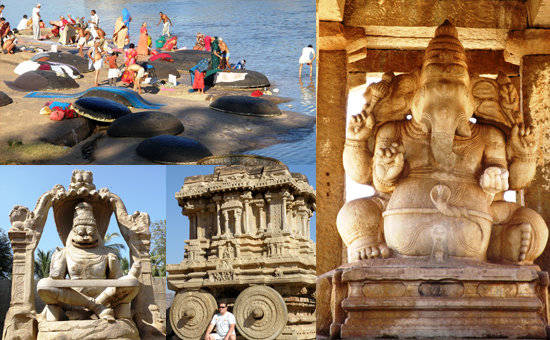 Hampi is a must see.
Hampi is a must see.
Q28. Does the Waqf Board
have to give a notice the general public and
to conduct an open hearing to enable the affected persons or the persons having interest or title over the
property to present their case?
A28. Legal sources state apparently NO. Appears rather unusual.
Comment: If no, then
such an approach could be construed as against the principles of natural
justice?
Q29. Implementation of decisions of Waqf Boards?
A29. According to Section 28 the 1995 Act, “Subject to the provisions of this Act and the rules made thereunder, the District Magistrate or in his absence an Additional District Magistrate or Sub-Divisional Magistrate of a District in the State shall be responsible for implementation of the decisions of the Board which may be conveyed through the Chief Executive Officer and the Board may, wherever considers necessary, seek directions from the Tribunal for the implementation of its decisions.”
Question: Does this imply that the District Magistrate has to implement the
decisions of the Waqf Board, without
asking any questions? This
too seems rather usual and contrary to basic tenets of law, at least in a
democratic nation.
Are Followers of Dharma allowed this
privilege?
Q30. Do Civil Courts have jurisdiction
over the Waqf Board?
A30. The Madras High Court came to the
conclusion that civil court has no jurisdiction as per Section 85 of The Waqf Act, 1995 and all the
issues related to waqf and waqf properties ought to be presented before the
waqf Tribunals. Source
Read
Controversies associated with the 1995 Act.
Comment: This seems rather strange. One can argue that the law recognises an exclusive and parallel judicial system, which is perhaps contrary to the
Constitution?
Q31. Where can one appeal against decision of Wafq Tribunal?A31. Anyone who is unhappy with the decision of the Wafq Board can appeal to the Wafq Tribunal relating to waqf or waqf property (Section 83).
Section 83 (5) states that, “The Tribunal shall
be deemed to be a civil court and shall have the same powers as may be
exercised by a civil court.” Section 83 (7) states, “The decision of the Tribunal shall be final and binding and it shall have the force of a decree made by a civil court.”
Question: Is there a similar Tribunal structure for Followers of Dharma?
Section 83 (9) states, “No appeal shall lie against any decision or order whether interim or otherwise, given or made by the Tribunal.” However, a High Court may under certain conditions review the Tribunal’s decision.
Q32. According to the Waqf Act 1995,
does income received from Waqf properties to be used for the benefit of Muslims
only or benefit of all Indians.
A32. Legal sources state both (even foreigners).
Question: Should Indian Charities spend only for benefit of Indian Citizens, at best add Persons of Indian Origin?
Q33. Applicability of
Limitation Act?
A33. Section 107 provides that the 1963 Limitation Act shall not apply to suit for possession of immovable
property comprised in Waqf or possession of interest in such property.
Simply put, this section gives unlimited power to the
Waqf Board to recover any property in the name of Waqf after any number
of years. However, this Act includes of
recovery of property belonging to
Hindus Jains Buddhists and Sikhs. 4
Comment/question: Do Mutts and Churches run by non-Muslims in India have
such a concession?
What section 107 does is that Waqf Boards have been given free hand to recover any
property even after 50 years but Hindus cannot recover their properties
after lapse of limitation period.
Q34. Before 2013, in S. 8, there
was provision that the cost of making survey publication of the
list of Waqf shall be borne by all
the mutawalli of the Waqf.
A34. But now Section 10 of the 2013 amendment reads: “The total cost of making a survey including the cost of publication of the list or lists of auqaf under this Chapter shall be borne by the State Government.”
Question: Why should the cost of survey and publication of private property be funded by tax-payers money?
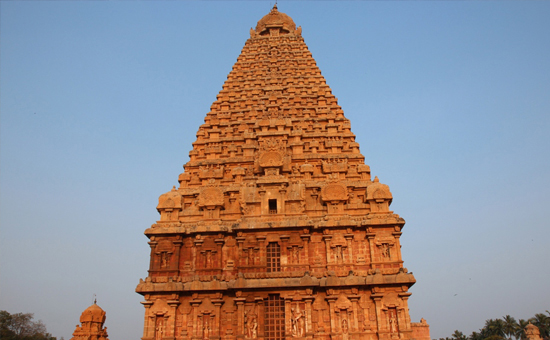 There is nothing in the world like Bridesvara Temple, Thanjavur.
There is nothing in the world like Bridesvara Temple, Thanjavur.
Q35. What is National Waqf Development Corporation Limited
(NAWADCO)?
A35. To fill the gap of development deficit NAWADCO was established with an authorized capital of Rs 500 crore and paid up share capital of Rs.100 crore, on 31st December, 2013 with a specific mandate to develop invaluable Waqf properties across India and to enhance the income of State Waqf Boards/ Waqf institutions for socio economic empowerment of the minorities.” Source
NAWADCO’s Board of Directors (accessed on 29.5.22 at 1.14 pm) consists of 3 IAS Officers, 1 IRS officer and two Independent Directors, 1 of whom is a CA and another a Muslim. Source
Its
objectives are “To act as a specialized financial and developmental institution for the development of Waqf properties, To provide consultancy i.e. managerial, financial and engineering to the Waqf Boards/ Waqf Institutions and Mutawalli, To arrange financial assistance based on Islamic Shariah Principle, Guiding Waqf Boards/ Waqf Institutions and Mutawalli for the management and utilization of surplus income based on Shariah Principles.” Source
According
to NAWACO site, “Agreement has been executed by and between NAWADCO & Haryana Waqf Board to develop land parcel at Panipat.”
Questions: Must a secular government arrange financial assistance based on Shariah principles? Does the government make such exceptions for non-Muslim communities?
Q36. Are Hindus denied Right to Equality because of Waqf Act?
A36. The special
status given to Waqf properties violates Articles 14 and 15 of the Constitution. Article 14
guarantees equality before law and equal protection of law whilst Article 15
prohibits discrimination on grounds of religion, race, caste, sex or place of
birth.
Trust and religious endowments of all communities are governed by the “Religious Endowment Act 1863, Indian Trustees Act 1866, Indian Trust Act 1882, Charitable Endowment Act 1890, Official Trustees Act 1913 and Charitable and Religious Act 1920.” 4
Question: Should there be a separate law for Waqf properties?
Q37. What is a Section 8 Company under the Companies Act, 2013?
A37. The Telangana and West Bengal
Waqf Board sites say it is a corporate body. Thus, it can be a Section 8
company or a company created by a Statue.
According
to an Institute of Company Secretaries of India booklet objects of a section 8 company must include, “promotion of commerce, art, science, sports, education, research, social welfare, religion, charity, protection of environment or any such other object.” Its profits have to be used for these objects and it cannot pay dividends.” 7 For income-tax read on.
Comment: Need clarity on what is the legal status of a Waqf Board.
Q38. Do the activities of the Waqf Board fall within section 2 (15) of the Income-tax Act 1961, which defines ‘charitable purpose’?
A38. Legal sources say
Yes provided their work is covered under 2(15).
Q39. What is Charitable Purpose under the Income Tax Act
1961?
A39. Under 2(15), “Charitable Purpose includes relief of the poor, education, medical relief, preservation of environment (including watersheds, forests and wildlife) and preservation of monuments or places or objects of artistic or historic interest, and the advancement of any other object of general public utility.” Source incometaxindia.gov.in
Q40. Can Waqf Board issues receipts, for donations received
under section 80G of the Income-Tax Act?
A40. Legal sources say Yes.
Comment: However, it needs to be examined if Waqf/Board are registered
as a religious charity and its charitable purpose is covered by section 2(15)
stated above.
However,
the word religious purpose is not defined in the Act so not clear if the work
is considered religious or and charitable.
In
comparison any trust that engages in religious preaching, or works for a
particular caste or creed, is not eligible for 80G certification. According to
a research
paper prepared by CA Sunil Talati, “Normally the religious trusts are not allowed to be approved under section 80G. However, Section 80G (5B) allows for a charitable organisation to have a religious activity not exceeding 5% of the total income in that previous year.”
Comment: So, the basis on which Waqf Boards issue 80G certificates needs to be ascertained.
Q41. Do section 8 companies have to comply with Section 11 of
the Income-tax Act 1961 i.e. income from property held for charitable or religious
purposes?
A41. According to
Section 11, income received from property under a trust or voluntary
contributions with a specific direction that they shall form part of the corpus
of the trust shall not be included in the total income provided the trust
spends, for charitable or religious purposes, 85% of the amounts so received in
the year of receipt. If such 85% is not spent, it can be accumulated or set
apart, provided certain conditions are fulfilled, which shall in no case exceed
five years.
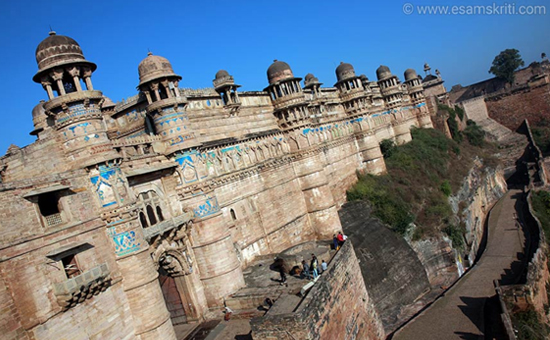 Raja Man Singh Palace, Gwalior Fort.
Raja Man Singh Palace, Gwalior Fort.
Question: Does such a provision apply to Wafq income?
Closing observations:
1. Clearly, there is no equality before law on Trust vs.
Waqf matter!
2. Should the law provide circumstances under which waqf
property can be alienated?
3. In a Constitution driven state can dedication of any
property, waqf or otherwise i.e. part of India, be perpetual,
inalienable and irrevocable in nature?
4. Should India to have a “Uniform Law for Trust and Trustees, Charities and Charitable Institutions, and Religious Endowments and Institutions?”
This
article was first published in www.swarajyamag.com
and HERE
References
1. A
Historical perspective on Waqfs in India
2.
How is a Waqf created and laws that govern such
properties
3.
Understanding Essential Provisions of the Waqf
Act 1995
4. Petition in Delhi High Court dated 18.4.2022
5. No
proof of existence of mosque: SC dismisses Rajasthan Waqf Board plea
6.
Big Jolt to Waqf – Talk on May 1, 2022
7. FAQ on Section 8 Companies by The Institute of Company Secretaries dated August 5,
2016.
8. Mohammaden
Trusts under Muslim Law (includes comparison of Trust vs
Waqf)
9. NGO
registration and legal procedure
10. Section
11 of the Income-Tax Act 1961
11. Section
12 of the Income-Tax Act 1961
12. Section
12A of the Income-Tax Act 1961